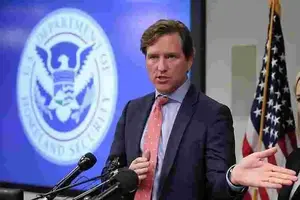
US President Donald Trump announced he had fired a Department of Homeland Security official who has publicly contradicted his unfounded claims about widespread election fraud.
Mr Christopher Krebs, a previous Microsoft executive, was nominated by Mr Trump to a top cyber security job in 2018 and became the first director of the Cybersecurity and Infrastructure Security Agency, called Cisa, afterwards that year.
President Trump also signalled that he intends to nominate the acting Comptroller of the Currency to a new five-year term, potentially complicating plans that the incoming Biden administration has to impose tougher regulations on Wall Street banks.
In a statement on Tuesday, the White House said it intends to submit Mr Brian Brooks' name to the Senate for confirmation.
Mr Krebs drew the ire of Mr Trump after Cisa declared that the Nov 3 election was "the most secure in American history".
In a tweet on Tuesday evening, Mr Trump said he was finished with Mr Krebs.
"The recent statement by Chris Krebs on the security of the 2020 Election was highly inaccurate, in that there were massive improprieties and fraudincluding dead people voting, Poll Watchers not allowed into polling locations, 'glitches' in the voting machines which changed votes from Trump to Biden, late voting and several more," Mr Trump tweeted, adding that he was terminating Mr Krebs "effective immediately".
Even before the election results were known, Mr Trump had cast doubt on the integrity of the vote, and those allegations have escalated since Mr Joe Biden was declared the winner by media organizations after securing enough electoral votes.
Mr Trump's firing of Mr Krebs, which several had expected, including Mr Krebs himself, came after business hours and capped a day of setbacks and controversy in his supporters' efforts to challenge the election's results.
In Pennsylvania, the state Supreme Court rejected his campaign's key argument that Republican vote observers were kept too far away to properly monitor ballot-counting, while in Michigan, GOP officials stonewalled the certification of the election outcome in the greater Detroit area before agreeing to certify the results.
Leading up to the election, Mr Krebs had used Cisa's website to debunk claims of voter fraud being peddled by Mr Trump and his supporters. The site challenged allegations that votes had been cast on behalf of dead people and that "secret" watermarks on ballots were helping audit illegal votes.
Meanwhile, the President's plan to nominate Mr Brooks as acting Comptroller of the Currency (OCC) is a highly unusual movecoming just weeks before what is likely the end of Mr Trump's time in office. The move could force Mr Biden to rely on never-used legal authority to try to remove Mr Brooks and replace him with a more aggressive watchdog.
The law says a comptroller can be ousted by the president "upon reasons to be communicated by him to the Senate"a power that has gone untested.
Most of the major regulations for US banks are written and approved in collaboration among the Federal Reserve, Federal Deposit Insurance Corp (FDIC) and the OCC.
Having Trump appointees atop any of those agencies could affect how much rule-making can be done by Mr Biden's own picks. The FDIC is already expected to be run by chairman Jelena McWilliams, a Trump nominee, until 2023, and Fed vice-chairman for supervision Randal Quarles can stay in his role until late next year. The OCC was thought to be the only slot immediately open for Mr Biden to start remaking banking policy.
Mr Brooks would not have much time to be confirmed before Mr Biden is sworn in on Jan 20. He must face a hearing before the Senate Banking Committee and needs to be approved by that panel before his nomination could be considered by the Senate.
BLOOMBERG